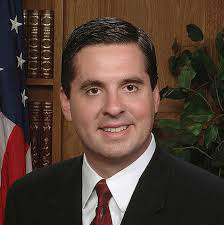WASHINGTON, (Reuters) – The Republican head of a congressional inquiry into alleged Russian meddling in the 2016 U.S. presidential election said he would temporarily step aside from the probe yesterday because he is under investigation for disclosing classified information.
Devin Nunes, chairman of the House of Representatives Permanent Select Committee on Intelligence and an ally of Republican President Donald Trump, characterized charges that he made unauthorized disclosures of classified information as “entirely false and politically motivated.”
“Several leftwing activist groups have filed accusations against me with the Office of Congressional Ethics,” he said in a statement.
The surprise disclosure that Nunes was under investigation injected new uncertainty into the wider Russia probe by his committee. The investigation is one of several in Congress examining whether Russia tried to influence the election in Trump’s favor, mostly by hacking Democratic operatives’ emails and releasing embarrassing information, or possibly by colluding with Trump associates.

Russia denies the allegations, which Trump also dismisses. The House Ethics Committee issued a statement saying it would investigate allegations Nunes may have made unauthorized disclosures of classified information “in violation of House Rules, law, regulations, or other standards of conduct.”Nunes said in a statement he had decided to step aside from the Russia investigation to fight the allegations and wanted “to expedite the dismissal of these false claims.” He remains committee chairman. Representative Mike Conaway, the second-ranked Republican on the intelligence committee, will now lead the probe. While he was a strong Trump supporter last year, the seven-term congressman was not a member of Trump’s transition team, unlike Nunes.
The intelligence panel’s top Democrat, Representative Adam Schiff, said Nunes’ decision to step aside was made in “the best interests of the committee, and I respect that decision.”
Schiff had called on Nunes to recuse himself.
Conaway, who is also chairman of the House Agriculture Committee and a former House Ethics chairman, is respected as an administrator and investigator.
“I have great admiration and respect for Mr. Conaway and look forward to continuing to work on that together,” Schiff told reporters.
Democrats, and some Republicans, had said the House panel risked losing all credibility after Nunes received information at the White House that information about Trump aides had been swept up in routine surveillance, held a news conference and briefed Trump on it – all before sharing it with other members of his committee.
Lawmakers said Nunes’ decision was welcome.
“We need to move on. We need to have an independent, credible investigation that makes progress,” Representative Eric Swalwell, a Democratic committee member, said in an interview.
Trump praised Nunes as “honourable,” calling both him and Conaway “high-quality” people in comments to reporters traveling to Florida on Air Force One.
The ethics investigation stems from whether Nunes disclosed classified information while publicly discussing the contents of foreign intelligence reports.
Jane Harman, a former top House Intelligence Democrat who is now president of the Wilson Center think tank, said she hoped the committee could “overcome the paralysis” gripping the investigation. “Most people recognize that the House as an institution needs to do serious oversight here and that the House is on trial,” she said.
House Republican leaders, including Speaker Paul Ryan, praised Nunes.
“He’s just making sure that as he works through this other (ethics) process and makes sure that people understand he didn’t do anything wrong. He’s fully cooperating, and I believe he will be cleared,” Representative Cathy McMorris Rodgers, who leads the House Republican Conference, told reporters.
“But until that happens, it protects the integrity of the Russia investigation,” she said.
Trump sparked a controversy in March when he tweeted, without giving evidence, that Obama had wiretapped him as he competed with Democrat Hillary Clinton in 2016.
Two and a half weeks later, Nunes held the news conference saying an unidentified source had shown him intelligence reports containing “unmasked” names of Trump associates incidentally caught up in routine foreign surveillance.
Immediately afterward, critics said he had disclosed classified information in what many saw as an effort to provide cover to Trump’s wiretapping claim and distract from the wider Russia investigation, a day after FBI Director James Comey confirmed at a hearing that his agency was investigating the matter.
Nunes said surveillance of Trump associates appeared legal but expressed concern that Americans’ names may have been improperly revealed.
That allegation kicked off an evolving, unsubstantiated controversy about whether the Obama White House spied on the incoming Trump administration.
U.S. foreign intelligence activities are classified, but the president can authorize the release of information about them. It is not clear whether Trump authorized Nunes to discuss the foreign surveillance.




